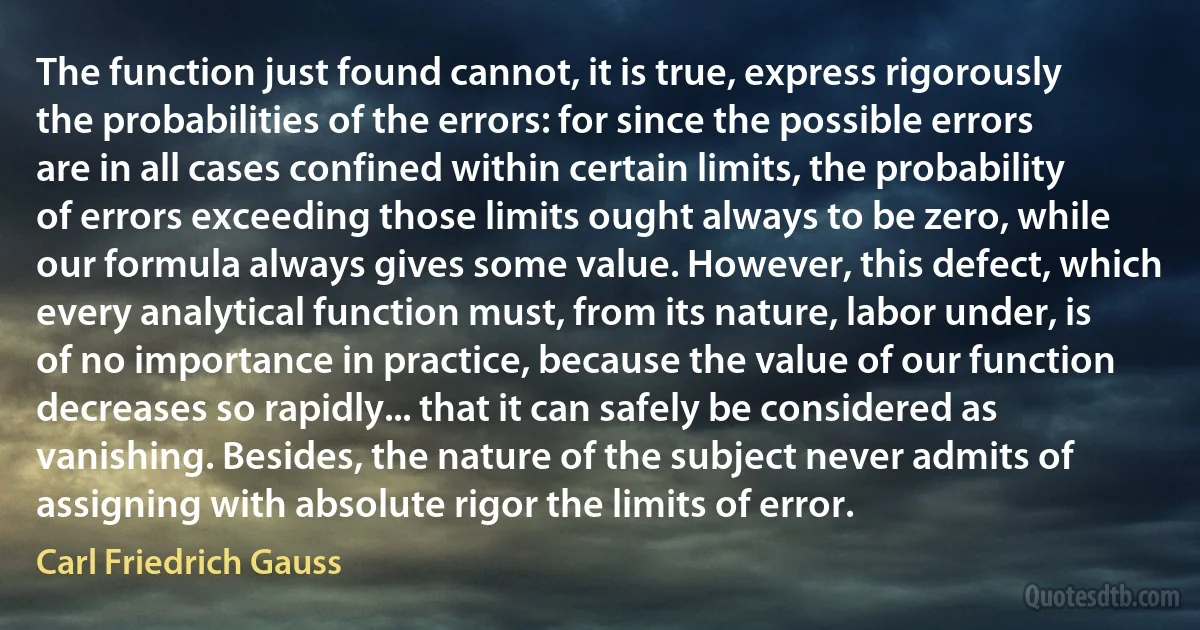
The function just found cannot, it is true, express rigorously the probabilities of the errors: for since the possible errors are in all cases confined within certain limits, the probability of errors exceeding those limits ought always to be zero, while our formula always gives some value. However, this defect, which every analytical function must, from its nature, labor under, is of no importance in practice, because the value of our function decreases so rapidly... that it can safely be considered as vanishing. Besides, the nature of the subject never admits of assigning with absolute rigor the limits of error.
Carl Friedrich GaussRelated topics
assigning certain error found gives labor nature ought possible practice probability rigor under value vanishing while zeroRelated quotes
What is a charitable heart? It is a heart which is burning with love for the whole creation, for men, for the birds, for the beasts ... for all creatures. He who has such a heart cannot see or call to mind a creature without his eyes being filled with tears by reason of the immense compassion which seizes his heart; a heart which is softened and can no longer bear to see or learn from others of any suffering, even the smallest pain being inflicted upon a creature. That is why such a man never ceases to pray for the animals ... [He is] ... moved by the infinite pity which reigns in the hearts of those who are becoming united with God.

Isaac the Syrian
It is a fearful thing to hate whom God hath loved. To look upon another-his weaknesses, his sins, his faults, his defects is to look upon one who is suffering. He is suffering from negative passions, from the same sinful human corruption from which you yourself suffer. This is very important: do not look upon him with judgmental eyes of comparison, noting the sins you assume you'd never commit. Rather, see him as a fellow sufferer, a fellow human being who is in need of the very healing of which you are in need. Help him, love him, pray for him do unto him as you would have him do unto you.

Tikhon of Zadonsk
In practice, quantum mechanics merely gives predictions with probabilities attached. This should be considered as a normal and quite acceptable feature of predictions made by science: different possible outcomes with different probabilities. In the world that is familiar to us, we always have such a situation when we make predictions. Thus the question remains: What is the reality described by quantum theories? I claim that we can attribute the fact that our predictions come with probability distributions to the fact that not all relevant data for the predictions are known to us, in particular important features of the initial state.

Gerardus 't Hooft
The fact that the most arbitrary powers of the English executive must always be exercised under Act of Parliament places the government, even when armed with the widest authority, under the supervision, so to speak, of the Courts. Powers, however extraordinary, which are conferred or sanctioned by statute, are never really unlimited, for they are confined by the words of the Act itself, and, what is more, by the interpretation put upon the statute by the judges. Parliament is supreme legislator, but from the moment Parliament has uttered its will as lawgiver, that will becomes subject to the interpretation put upon it by the judges of the land.

A. V. Dicey
Every pitifulest whipster that walks within a skin has had his head filled with the notion that he is, shall be, or by all human and divine laws ought to be, 'happy.' His wishes, the pitifulest whipster's, are to be fulfilled for him; his days, the pitifulest whipster's, are to flow on in an ever-gentle current of enjoyment, impossible even for the gods. The prophets preach to us, Thou shalt be happy; thou shalt love pleasant things, and find them. The people clamor, Why have we not found pleasant things?... God's Laws are become a Greatest Happiness Principle. There is no religion; there is no God; man has lost his soul.

Thomas Carlyle
